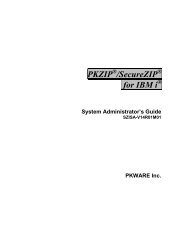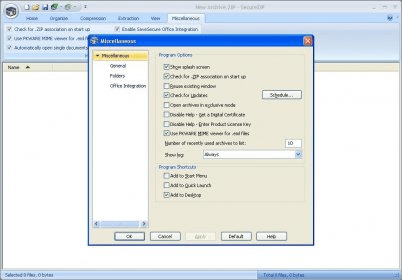

These files worked with the archive file format used by ARC and were significantly faster than ARC on the IBM-PC platform due to selective assembly-language coding. Later, Phil Katz developed his own shareware utilities, PKARC and PKXARC, to create archive files and extract their contents. This hybrid technique was later used in several other compression schemes by Phil Katz and others. Additional compression could be achieved by using Huffman coding on the LZW data, and Howard's version of ARC was the first program to demonstrate this property. Howard's work was also the first to disprove the prevalent belief that Lempel-Ziv encoded files could not be further compressed.
#Pkware securezip 12.5 portable#
This more portable codebase was subsequently ported to other platforms, including VAX/VMS and IBM System/370 mainframes. The source code for ARC was released by SEA in 1986 and subsequently ported to Unix and Atari ST in 1987 by Howard Chu. The archive files produced by ARC had file names ending in ".ARC" and were thus sometimes called "arc files". In 1985, Thom Henderson of System Enhancement Associates wrote a program called ARC, based on earlier programs such as ar, that not only grouped files into a single archive file but also compressed them to save disk space, a feature of great importance on early personal computers, where space was very limited and modem transmission speeds were very slow. Several unofficial extractors exist for this type of ARC file. Nintendo uses an unrelated "ARC" format for resources, such as MIDI, voice samples, or text, in GameCube and Wii games. arc extension, but uses a completely different file format. For example, the Internet Archive used its own ARC format to store multiple web resources into a single file. arc filename extension is often used for several unrelated file archive-like file types.

The format was later replaced by the ZIP format, which offered better compression ratios and the ability to retain directory structures through the compression/decompression process. ARC was convenient as it combined the functions of the SQ program to compress files and the LU program to create. The format is known as the subject of controversy in the 1980s, part of important debates over what would later be known as open formats.ĪRC was extremely popular during the early days of the dial-up BBS. The file format and the program were both called ARC. ARC is a lossless data compression and archival format by System Enhancement Associates (SEA).


 0 kommentar(er)
0 kommentar(er)
